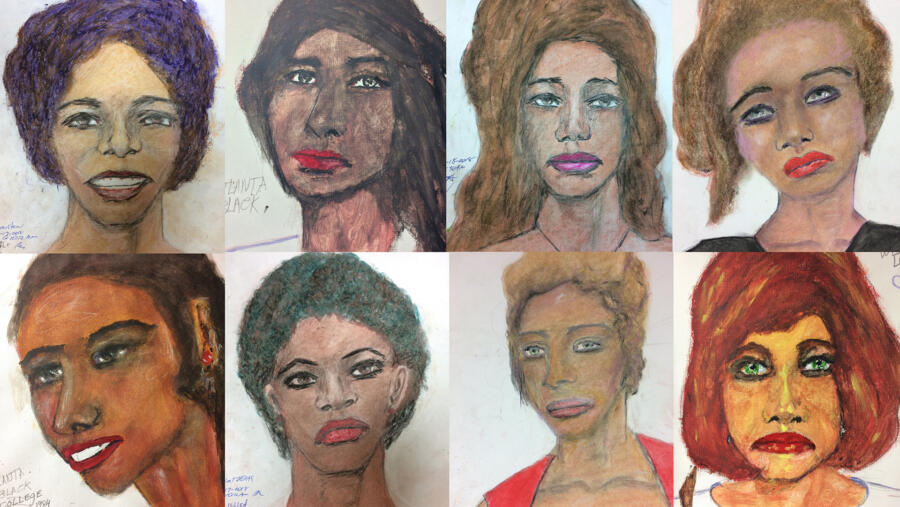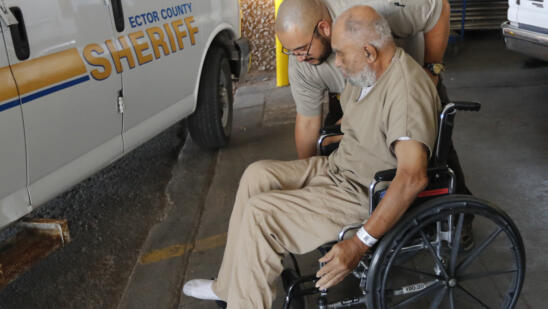Samuel Little murdered as many as 93 women, some almost a half century ago. But all these years later, he still remembers their faces.
From his Texas jail cell, the 78-year-old Little recently drew color portraits of 16 of the women he killed, including intricate details like their facial shapes, eye color and ethnicity. The drawings were so accurate, they may help police identify some of his still-unknown victims, many of whom were prostitutes or drug addicts. The drawings have already been linked to two cold cases, The New York Times reported.
Yet Little doesn’t remember details like his victims’ names, or when he committed the crimes, according to the FBI’s Violent Criminal Apprehension Program (ViCAP).
This spotty attention to detail is not unusual, says sociology and criminology professor Jack Levin, who for decades has studied serial killers’ minds, motivations and modus operandi.
A&E True Crime spoke with Levin, author of 31 books, including his latest, The Allure of Premeditated Murder, who explained how serial killers remember their victims and why these details are so important to them.
To what degree do serial killers remember their victims, and what do they do with that knowledge?
To a serial killer, his crimes are often his greatest accomplishments in life. If you understand that, you understand why he might remember the details of his crime.
He remembers the characteristics of his victims because he wants to relive his crimes. He wants to reminisce about the good times he had inflicting pain and suffering on his victims. The location is almost irrelevant. The time frame is almost meaningless. What really counts is how the victim appeared during the crime, and how he changed the victim. It also explains why [some] serial killers collect trophies or souvenirs the way baseball players collect their home run balls. They use the objects they take from the crime scene to help them relive those good times they had with their victims.
Little remembers a lot about his victims. Is this normal? Are victims’ faces seared into a serial killer’s memory?
You wouldn’t usually remember the details, or someone’s facial characteristics, for three decades. But you might if it was one of the happiest moments of your life. That is exactly what serial killers recall.
How do they think of their victims? As human beings?
Serial killers tend to regard their victims as subhuman, as existing at the level of inferior animals rather than human beings. In a sense, they go big-game hunting for the thrill. [In their minds] their prey deserve the same fate as a lion or a tiger in the wild.
Do they remember details because they regret, or are traumatized, by their actions?
No. I think they use the details to relive the crimes in their minds because they enjoyed them so much. There are a few exceptions, but serial killers have no conscience. They’re sociopaths. They have empathy, but not the normal kind of empathy. They actually feel pleasure when they inflict pain. So they don’t feel the victim’s pain as pain, they feel it as pleasure. The more they inflict pain and suffering, the more pleasurable their experience. It’s a perverted, bizarre kind of empathy.
Do serial killers have photographic memories?
No. I’ve never heard that, and I don’t believe that. I’ve seen the whole range of serial killers and some of them are geniuses. A few have photographic memories and have very high IQs. But there are just as many who have very low IQs and would have trouble remembering their own names. Most are in the middle. But serial killers tend to have skills that other killers lack.
What kinds of skills?
They have street smarts. They have a gift of staying out prison, so they can stay out on the loose for decades. Most murders are solved within 48 hours. But serial killers can stay on the loose for long periods of time.
Most serial killers are quite organized. They approach the crime scene in an organized way—carrying a weapon with them, waiting for the optimum moment to strike, so as not to be seen by eyewitnesses. When they leave the crime scene, they either clean it, or sometimes carry the victim’s body to a dump site, so the body isn’t found for a considerable period of time. That gives them the advantage.
Serial killers also have a skill for presentation of self: impression management. They can look like the most innocent person you would ever meet. If you’re a serial killer and you look so innocent, it helps you get away with murder.
Why do serial killers help the police after they’re caught? Why would Little draw those pictures for investigators? Or why did John Wayne Gacy, for example, lead police to where he buried bodies of his victims?
Little’s in jail, so he probably figured, if I can’t do it, at least I can draw it. It helped him relive [the murders].
For Gacy, these are tremendous accomplishments and he was proud of them. He wants to share that with everyone. Many serial killers attempt to establish a new record. They would love to be able to say they amassed the largest body count in recorded history. Mass murderers do that, too. The body counts have been getting larger and larger lately. Serial killers will often claim victims falsely, because they want to boost their numbers.
Is it about power too?
Yes. Power and control. They want to be big shots. They do that in a number of different ways. One is to play God with their victims. They can decide who lives and who dies.
Ted Bundy, for example, worked on a suicide hotline in Seattle and once saved the life of a 14-year-old boy. Saving a life, taking lives, were the same side of the coin for him.
Another way to achieve power is to inflict pain and suffering on the victim. Controlling the victim. So really, for many serial killers, the murder itself is a footnote. It’s the torture or the rape that gives the killer the thrill and the excitement he cherishes.
Another way to have power is to play a cat-and-mouse game with police. They send messages and cryptic clues. Son of Sam engaged in a dialogue with a columnist from the New York Daily News and gave him all types of cryptic clues. Lee Boyd Malvo and John Allen Muhammad (the D.C. snipers) left clues at the crime scenes after their fifth victim was killed. These are all designed to get attention.
So they come to feel invincible?
Yes. The BTK killer felt superior to law enforcement. He felt he had nothing to worry about at all, because he wasn’t even a suspect after being on the loose for 30 years. He got caught by sending a floppy disk. He didn’t know that much about technology, I guess.
You can also gain power by terrorizing a community. When the D.C. snipers killed 10 victims over a period of three weeks, they closed the schools in Virginia. People were standing under tarps to pump gas. Most organized serial killers love reading about themselves in the headlines. They go out of their way to read the newspaper, watch the television reports and the website reports. They do very much enjoy the attention they get nationally, and in some cases, internationally.
Like Charles Manson? You interviewed him in prison in 2007.
Yes. He told me he’s the most famous person that ever lived. At first, I thought, what an exaggeration. And then [after] I thought about it, [realized] it’s really only a slight exaggeration.
If I asked students, 18 to 22 years old, if they knew who Charles Manson was, every single person in the class would raise their hands. Even those not from the U.S. And he killed seven people in 1969! If he had killed seven people in 1939, he would have never gained that infamy. Manson had the media.
Related Features:
Who Is Serial Killer Samuel Little?
How Serial Killers Get in the Mood for Murder
Samuel Little: What Makes the Elderly Commit—and Later Confess to—Murder?


